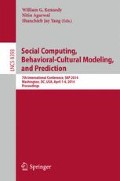Abstract
Surveys of rapidly-developing countries have shown that huge increases in average personal wealth are frequently accompanied by little or no increase in average (self-reported) happiness. We propose a simple agent-based model that may help to explain this phenomenon. The model shows that under certain conditions, the cumulative effect of individuals’ free choices of employment that maximizes their (self-perceived) personal well-being may actually produce a continuing decrease in the population’s average well-being. Like the proverbial “frog in a pot”, the eventual effect is worse when the onset of the decrease is more gradual. More generally, the model indicates that there is a natural tendency in free-market societies for well-being to become defined in increasingly materialistic terms. We discuss the implications of our model on the issue of incentive pay for teachers, and argue that our model may also provide insight into other situations where individuals’ free-market choices lead to progressive worsening of the population’s average well-being.
Access this chapter
Tax calculation will be finalised at checkout
Purchases are for personal use only
Preview
Unable to display preview. Download preview PDF.
References
Burkholder, R.: Chinese Far Wealthier Than a Decade Ago—but Are They Happier? The Gallup Organization, http://www.gallup.com/poll/14548/chinese-far-wealthier-than-decade-ago-they-happier.aspx (retrieved November 5, 2013)
Wong, C.K., et al.: Subjective well-being, societal condition and social policy—the case study of a rich Chinese society. Social Indicators Research 78, 405–428 (2006)
Easterlin, R.A.: Will Raising the Income of all Increase the Happiness of All? Journal of Economic Behavior and Organization 27(1), 35–47 (1995)
Lane, R.: The Joyless Market Economy. In: Ben-Ner, A., Putterman, L. (eds.) Economics, Values, and Organization, pp. 461–485. Cambridge University Press (1999)
Graham, C.: Happiness around the World: The paradox of happy peasants and miserable millionaires. Oxford University Press (2009)
Brockmann, H., Delhey, J., Welzel, C., Yuan, H.: The China Puzzle: Falling Happiness in a Rising Economy. Journal of Happiness Studies, doi:10.1007/s10902-008-9095-4
Wang, D.: The Study of Juvenile Delinquency and Juvenile Protection in the People’s Republic of China. Crime and Justice International 22(94), 4–14 (2006)
Wang, Q., Zhou, Q.: China’s divorce and remarriage rates: Trends and regional disparities. Journal of Divorce & Remarriage 51, 257–267 (2010)
Kahneman, D., Krueger, A.B.: Developments in the Measurement of Subjective Well-Being. Journal of Economic Perspectives 20(1), 3–24 (2006)
Alliance for Excellent Education, Teacher Attrition: A Costly Loss to the Nation and to the States (2005), http://www.all4ed.org (retrieved November 5, 2013)
Author information
Authors and Affiliations
Editor information
Editors and Affiliations
Rights and permissions
Copyright information
© 2014 Springer International Publishing Switzerland
About this paper
Cite this paper
Thron, C. (2014). “Frogs in a Pot”: An Agent-Based Model of Well-Being versus Prosperity. In: Kennedy, W.G., Agarwal, N., Yang, S.J. (eds) Social Computing, Behavioral-Cultural Modeling and Prediction. SBP 2014. Lecture Notes in Computer Science, vol 8393. Springer, Cham. https://doi.org/10.1007/978-3-319-05579-4_46
Download citation
DOI: https://doi.org/10.1007/978-3-319-05579-4_46
Publisher Name: Springer, Cham
Print ISBN: 978-3-319-05578-7
Online ISBN: 978-3-319-05579-4
eBook Packages: Computer ScienceComputer Science (R0)

